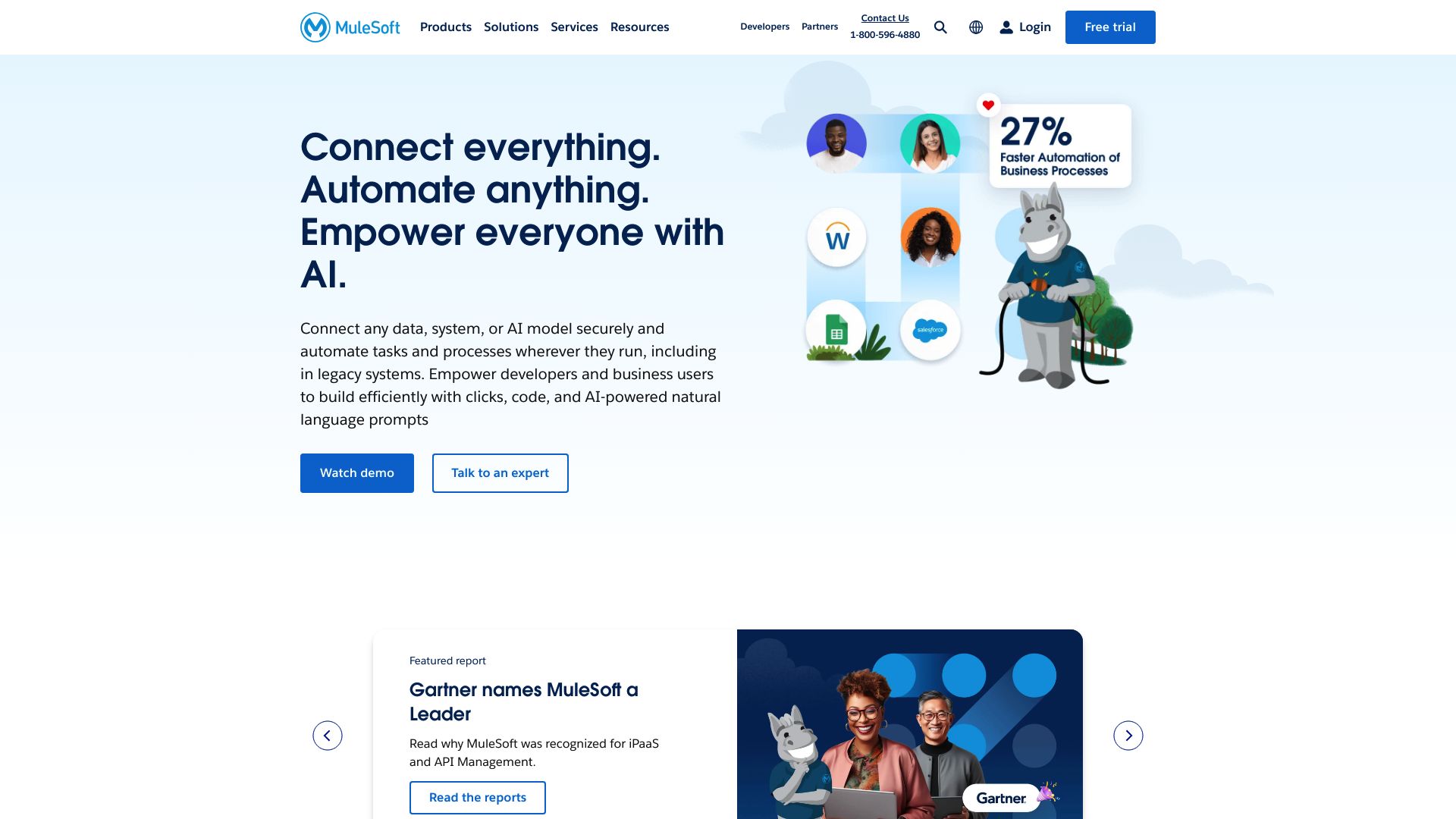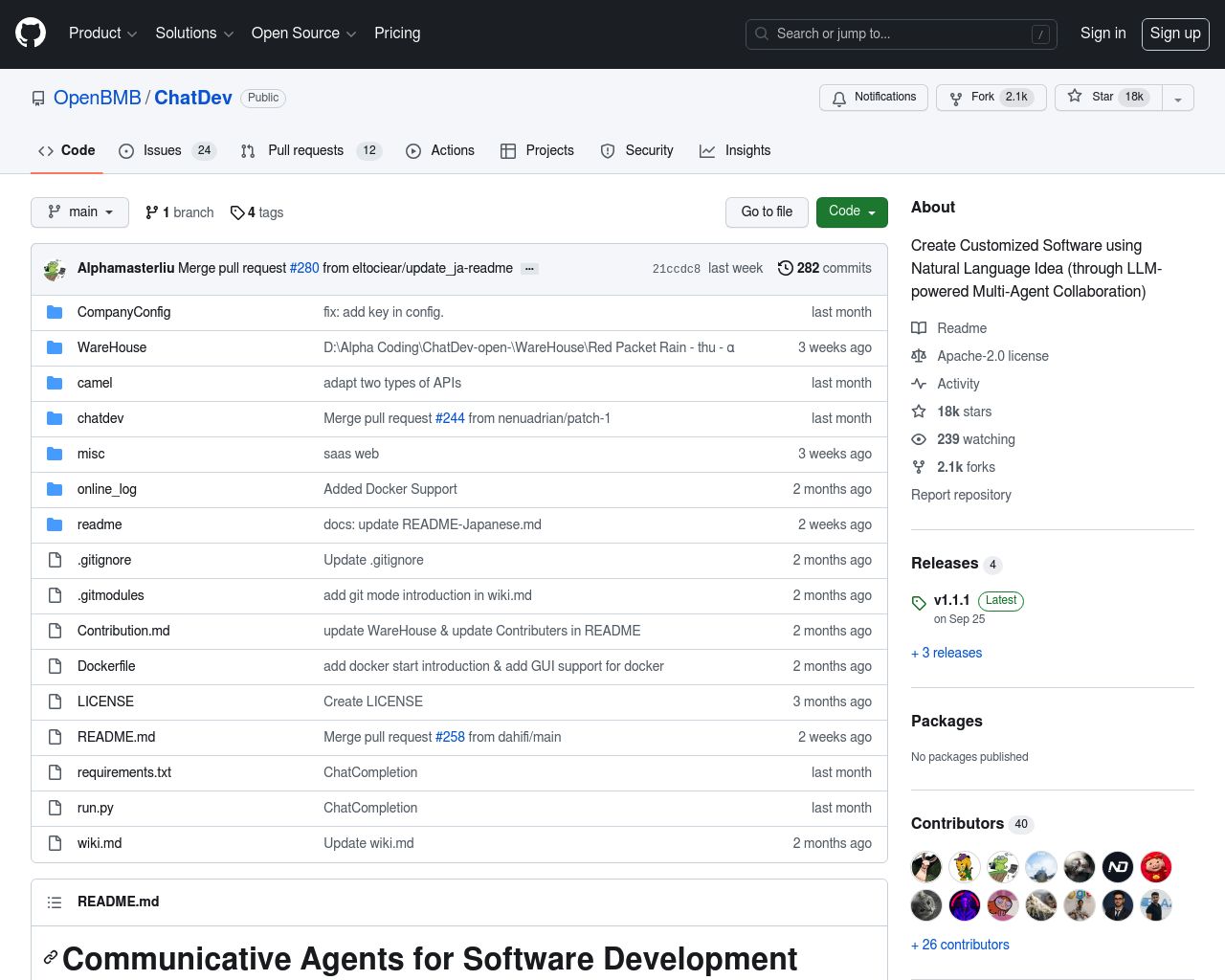Mulesoft vs. ChatDev: Comparing AI-Powered Development Platforms
AI-powered software development and integration platforms are transforming how businesses create, deploy, and manage applications. This comparison explores three leading solutions: Mulesoft vs. ChatDev, and SmythOS. Mulesoft offers enterprise-grade API management and integration capabilities, while ChatDev pushes the boundaries of AI-driven software development automation.
SmythOS emerges as a versatile alternative, combining powerful AI agent creation with extensive integrations and deployment options. We’ll examine each platform’s strengths, limitations, and ideal use cases to help you choose the right solution for your organization’s needs.
Mulesoft Overview
Mulesoft delivers a comprehensive integration platform designed to connect applications, data, and devices across on-premises and cloud environments. The Anypoint Platform empowers organizations to build application networks using API-led connectivity, unlocking data and digital capabilities.


Mulesoft’s core offering, the Anypoint Platform, provides tools for full API lifecycle management. Developers use Anypoint Studio, a visual development environment, to design and build APIs and integrations. For less technical users, Flow Builder enables no-code creation of integration flows. The platform supports deploying solutions across various environments, including CloudHub, on-premises runtimes, and Kubernetes clusters.
Mulesoft delivers a comprehensive integration platform designed to connect applications, data, and devices across on-premises and cloud environments.
AI integration capabilities set Mulesoft apart in the integration space. The platform connects with AI models like OpenAI and custom solutions to enhance business processes. Einstein AI integration in Anypoint Code Builder accelerates development through natural language prompts for project initiation. This AI-powered approach boosts developer productivity while maintaining robust security and governance through Anypoint Flex Gateway and API Governance features.
While Mulesoft offers powerful integration capabilities, its complexity may pose challenges for some users. The learning curve can be steep, particularly for those new to API-led integration approaches. Additionally, pricing can be a concern for smaller organizations, as enterprise-level features often come with corresponding costs. However, for large enterprises and organizations with complex integration needs, Mulesoft’s comprehensive feature set and scalability make it a compelling choice in the integration platform market.
ChatDev Overview
ChatDev revolutionizes software development by automating the entire process using large language models (LLMs). This open-source framework simulates a virtual software company where intelligent agents collaborate to create software applications rapidly and efficiently.
At its core, ChatDev leverages a multi-agent system to mimic roles typically found in software development teams. These AI agents, representing positions like CEO, CTO, programmer, and tester, communicate through a structured chat chain to break down complex development tasks into manageable steps. This innovative approach allows ChatDev to generate complete software applications, including source code, user manuals, and environmental dependencies, in a fraction of the time and cost compared to traditional methods.
ChatDev stands out for its ability to deliver a full software development cycle in minutes… it can produce a simple game application in under seven minutes for less than one dollar.
ChatDev stands out for its ability to deliver a full software development cycle in minutes. For example, it can produce a simple game application in under seven minutes for less than one dollar. The framework’s unique replay feature allows users to view the entire conversation between agents in a web app, providing unprecedented transparency into the development process.


ChatDev incorporates advanced features like thought instructions and self-reflection mechanisms to minimize errors and improve code quality. It also integrates with industry-standard tools such as Git for version control, enabling collaborative and concurrent development practices. These capabilities make ChatDev an attractive option for developers and companies looking to streamline their software creation processes.
While ChatDev offers significant advantages in terms of speed and cost-efficiency, potential users should consider its limitations. The framework’s reliance on LLMs means that the quality and reliability of the generated code may vary, potentially requiring human oversight and refinement. Additionally, as an open-source project, ChatDev may lack some of the robust support and extensive documentation found in commercial solutions.
Feature Comparison
Mulesoft and ChatDev offer distinct approaches to software development and AI integration. Mulesoft excels in enterprise-grade API management and integration, while ChatDev focuses on AI-driven software development automation.
Mulesoft provides robust API lifecycle management through its Anypoint Platform, enabling organizations to design, build, and deploy APIs across various environments. It offers visual development tools like Anypoint Studio and Flow Builder, catering to both technical and non-technical users. ChatDev, in contrast, leverages large language models to simulate an entire software development team, automating the creation of software applications from design to deployment.
A key difference lies in their core components. Mulesoft’s strength is in its extensive integration capabilities, supporting a wide range of APIs, data sources, and enterprise systems. It offers features like Anypoint Flex Gateway for API security and Einstein AI integration for enhanced development productivity. ChatDev, however, focuses on AI-driven code generation and collaboration between AI agents representing different development roles, potentially reducing the need for human developers in certain scenarios.
In terms of security, Mulesoft provides enterprise-grade features including data encryption, OAuth support, and IP control. ChatDev’s security aspects are less prominently highlighted, reflecting its focus on rapid software development rather than enterprise-level security concerns. This difference underscores Mulesoft’s suitability for large-scale, security-sensitive enterprise deployments, while ChatDev may be more appropriate for rapid prototyping and smaller-scale projects where development speed is paramount.
Feature Comparison Table
| Mulesoft | ChatDev | SmythOS | |
|---|---|---|---|
| CORE FEATURES | |||
| Visual Builder | ✅ | ❌ | ✅ |
| No-Code Options | ✅ | ❌ | ✅ |
| Memory & Context | ❌ | ✅ | ✅ |
| Explainability & Transparency | ❌ | ✅ | ✅ |
| Problem-Solving Capabilities | ❌ | ✅ | ✅ |
| Human-AI Interaction | ❌ | ✅ | ✅ |
| Audit Logs for Analytics | ❌ | ✅ | ✅ |
| Bulk Work | ✅ | ❌ | ✅ |
| Agent Work Scheduler | ✅ | ❌ | ✅ |
| SECURITY | |||
| Constrained Alignment | ✅ | ❌ | ✅ |
| Data Encryption | ❌ | ✅ | ✅ |
| IP Control | ✅ | ❌ | ✅ |
| COMPONENTS | |||
| Huggingface AIs | ❌ | ✅ | ✅ |
| Zapier APIs | ❌ | ✅ | ✅ |
| All other APIs, RPA | ❌ | ✅ | ✅ |
| Logic | ❌ | ✅ | ✅ |
| Data Lakes | ✅ | ❌ | ✅ |
| DEPLOYMENT OPTIONS (EMBODIMENTS) | |||
| Staging Domains | ✅ | ❌ | ✅ |
| Production Domains | ✅ | ❌ | ✅ |
| Deploy as Scheduled Agent | ❌ | ❌ | ✅ |
| Scalability | ❌ | ❌ | ✅ |
| DATA LAKE SUPPORT | |||
| Hosted Vector Database | ✅ | ❌ | ✅ |
| Sitemap Crawler | ❌ | ❌ | ✅ |
| YouTube Transcript Crawler | ❌ | ❌ | ✅ |
| URL Crawler | ❌ | ✅ | ✅ |
| PDF Support | ❌ | ✅ | ✅ |
| TXT File Support | ✅ | ❌ | ✅ |
Best Alternative to Mulesoft and ChatDev
SmythOS emerges as the superior alternative to Mulesoft and ChatDev, offering a comprehensive platform for AI agent development and deployment. We provide an intuitive drag-and-drop interface that simplifies the creation of complex AI workflows, making advanced AI functionalities accessible to users with varying levels of technical expertise.
Our platform excels in ease of use, boasting a rich feature set that spans from visual building tools to advanced deployment options. Unlike Mulesoft’s focus on API management or ChatDev’s emphasis on simulated software development, SmythOS delivers a versatile ecosystem for crafting AI agents capable of tackling unlimited use cases. Whether you’re building chatbots, automating business processes, or developing sophisticated AI applications, our platform adapts to your needs.
SmythOS stands out with its robust security features, including data encryption and OAuth support, addressing enterprise-level concerns that ChatDev may overlook.
SmythOS stands out with its robust security features, including data encryption and OAuth support, addressing enterprise-level concerns that ChatDev may overlook. We also offer unparalleled scalability, ensuring your AI solutions grow seamlessly with your business needs—a critical advantage over both Mulesoft and ChatDev.
Our platform’s strength lies in its extensive integration capabilities. While Mulesoft excels in API management, SmythOS goes further by supporting a wide array of AI models, APIs, and data sources. This includes integration with popular services like Zapier, Hugging Face models, and various data formats, providing a level of flexibility that surpasses both Mulesoft and ChatDev. By choosing SmythOS, you’re not just getting an AI agent builder; you’re investing in a future-proof solution that will evolve with your AI ambitions.
Conclusion
Mulesoft and ChatDev offer distinct approaches to software development and integration, each with unique strengths. Mulesoft excels in enterprise-grade API management and integration, providing robust tools for designing, building, and deploying APIs across various environments. Its Anypoint Platform and AI-powered features like Einstein AI integration make it a solid choice for large organizations with complex integration needs.
ChatDev, on the other hand, pushes the boundaries of AI-driven software development. Its ability to simulate an entire development team using large language models offers unprecedented speed and cost-efficiency in creating software applications. This innovative approach can be particularly appealing for rapid prototyping and smaller-scale projects where development velocity is crucial.
However, SmythOS emerges as the superior option, combining the best of both worlds while addressing their limitations. Our platform offers a comprehensive solution for creating and deploying AI agents with unparalleled ease and flexibility. SmythOS’s drag-and-drop interface democratizes AI development, making it accessible to both technical and non-technical users. With support for over 300,000 integrations and compatibility with various AI models, SmythOS provides the versatility needed in today’s dynamic business environment.
Unlike Mulesoft’s potentially steep learning curve and ChatDev’s reliance on AI-generated code that may require human refinement, SmythOS strikes the perfect balance between power and usability. Our platform enables you to create once and deploy SmythOS Agents anywhere, whether as APIs, chatbots, or scheduled tasks. This flexibility, combined with robust security features and scalability, makes SmythOS the ideal choice for businesses of all sizes looking to harness the power of AI.
We invite you to experience the future of AI-powered automation and integration. Create a free SmythOS account today and discover how our platform can transform your workflow, boost productivity, and drive innovation in your organization. With SmythOS, you’re not just adopting a tool; you’re embracing a new era of intelligent, efficient, and scalable software solutions.
Last updated:
Disclaimer: The information presented in this article is for general informational purposes only and is provided as is. While we strive to keep the content up-to-date and accurate, we make no representations or warranties of any kind, express or implied, about the completeness, accuracy, reliability, suitability, or availability of the information contained in this article.
Any reliance you place on such information is strictly at your own risk. We reserve the right to make additions, deletions, or modifications to the contents of this article at any time without prior notice.
In no event will we be liable for any loss or damage including without limitation, indirect or consequential loss or damage, or any loss or damage whatsoever arising from loss of data, profits, or any other loss not specified herein arising out of, or in connection with, the use of this article.
Despite our best efforts, this article may contain oversights, errors, or omissions. If you notice any inaccuracies or have concerns about the content, please report them through our content feedback form. Your input helps us maintain the quality and reliability of our information.
